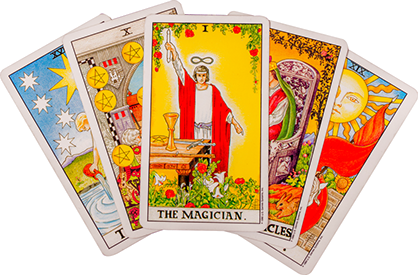Divine Venture

IN THE DECK of the tarot, the magician card represents a person who, through ingenuity and wizardry, can conjure whatever lurks in his imagination. It’s no wonder then that Paul O’Brien, founder and "chief visionary" of Tarot.com, has mounted a three-foot-tall replica of the card just outside his office window. "The magician is the ultimate trump," he says. "He can create something out of nothing."
In Tarot.com’s case, the statement seems particularly apt: O’Brien, who launched the company in 2000 with two software products that he was hawking from his basement, sold it last January for $21 million.
No longer the purview of nobblers and soothsayers, divination has become a profitable product since the advent of the Internet. Partly by providing daily horoscopes to the homepages of AOL and MySpace, Tarot.com drives some 6 million unique visitors to its own site each month, where they can sample free digital tarot card readings or try their hand at a digital version of I Ching, a divination system that originated in China.
Of these visitors, according to O’Brien, "about 2 percent are interested in going deeper, meaning they are willing to invest in having a more meaningful experience." Put in less mystical terms, tens of thousands of people each month will pay between $3 and $6 to upgrade from, say, a free three-card sample reading to an 11-card "Celtic Cross," which outlines more fully the obstacles that must be overcome en route to romantic bliss. With custom software standing in for a human diviner ("We eliminated the middleman," O’Brien says), much of the money that Tarot.com collects easily slides from the gross profits column and into the net.
Tarot.com was not O’Brien’s first foray into the world of what he calls "divination technology." In 1989, the software salesman wrote an I Ching program for Apple that he called Synchronicity—the first software of its type to hit the market. Although sales of the floppy disks flopped, O’Brien went on to develop an I Ching CD-ROM called Oracle of Changes. Persuading computer stores to stock the quirky software package, however—and persuading consumers to buy it—required a serious marketing effort and resulted in slim profits.
Eventually O’Brien hit upon the idea of selling readings directly online and charging per transaction. In 2000, after procuring a $150,000 small-business loan, he set up shop in a defunct bowling alley on SW Barbur Blvd, hired a database guru and a Web developer, and went into business.
As O’Brien tells it, Tarot.com’s fortunes changed when AOL hired him to provide horoscopes for its homepage, which today logs more than 400 million searches per month. "I really ascribe the deal to good karma," he says, before confessing that he called an AOL content director every day for six months before securing the contract. Traffic to Tarot.com spiked, and in each of the last six years, according to the company’s figures, business has increased 40 percent, which suggests that those seeking insight don’t mind getting advice via a series of algorithms that simulate, say, the shuffling of cards. "I see this as a way to stimulate people’s intuition," says O’Brien, who wrote the text for the I Ching readings. "It’s really a form of self-help."
And it’s help that some find addictive: Some 70 percent of those who use the site are repeat visitors, a fact that made the company attractive to Jeff Bennett, COO of Massachusetts-based NameMedia, who employed little intuition in his decision to buy Tarot.com from O’Brien. The goal of NameMedia, which buys and holds Internet domain names, is to "build a large audience, monetize that audience, and do so in a way that is profitable," Bennett says.
O’Brien, on the other hand, has used a portion of his wealth to publish a book, Divination: Sacred Tools for Reading the Mind of God. As to what his future holds? The only thing he can be certain of is what will happen to his fortune when he’s gone: "I’m going to distribute it all to nonprofits," he says, "just like Warren Buffett."




